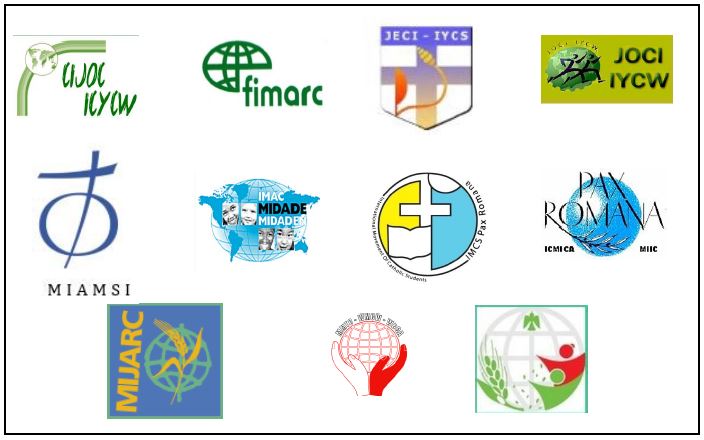1. Getting rid of our secret nature
Since we are convinced of the relevance of our pedagogy and our spirituality, it is urgent to express more clearly and with more determination our “know-how’s”. Our “theological scene” is the life of our contemporaries. Our source is this Jesus who has come so that we may all live our life to the full. Beyond being the leaven in the dough, we must know how to tell what the process of reappraisal of life changes for us and for the life of society.
This greater ability to be understood goes through some work on the actualisation of the implementation of the intuitions of the MIACS, on their pedagogy, on their methodology, on language too.
2. Putting our mode of action back in its context
Being parties to a society and a Church which are in a state of crises, we gauge the chance of being able to speak about it. How to explain this state of crisis?
– We are confronted with a radicalisation of our analysis which go against the “ready-to-think” dominant ideology. But at present, we notice a lack of philosophy and the absence of alternatives in relation to a world liberal economy: this does not help us to conceptualise our convictions stemming from the knowledge of our “grounds”
However we note that, in international organisations, for example, our actual presence allows us to say a word, to be known and recognises, to have, eventually, a certain influence.
– As far as theology is concerned, there are shortcomings too and this is a handicap regarding the vitality and expression of our spirituality. In their daily life, the members of the MIACS are impregnated with what constitutes the relationship between God and men. This consciousness strengthens our responsibilities in that field. As members of a Church in a state of crisis, which does not know precisely where it is heading, in opposite currents, is it not our responsibility to help the Church by reminding it of the fact that the pedagogy and spirituality of Catholic Action constitute the “normal” way of being Christian?
On the other hand, anthropological relationships upset our relationship with God: we want, at the same time, the relationship with God to be very incarnated and that it brings us hope and leads us to a “beyond”. This questions us on the relationship faith / inculturation.
3. Adapting our language
– Knowing how to express / translate
– The content of our analysis (state and vision of the world).
– The words and actions of the people belonging to our ground.
– What we understand of the Scriptures through the events of life and our rereading of life in the light of the Scriptures.
– Getting rid of the “jargon” as far as possible of explaining the meaning of the words used.
4. Reaffirming our spirituality…
– Linking up personal faith (I) / community and ecclesial faith (us in the Church), daily engagement.
– The reappraisal of one’s life is a good way to experience this.
– Chaplains have an important place in that field.
5. …And the identity of our movements, their credibility
We are :
– militants of the MIACS, engaged in society,
– believers, with convictions and doubts.
We are strongly attached to
– a certain moral / ethical attitude (fundamental human values in rela- tion to corruption, theft, etc),
– a pertinent analysis of society, of which we are totally part, centred on the life and action of people, our theological scene,
– the diversity and uniqueness of our movements,
– a more open relationship with other movements of civil society or other religions.
6. Rethinking the strategies to be implemented
– For what objectives ? With whom? How ?
– Our ground, what we have acquired ; in what fields are we competent ?
– Our ability to be more open, our allies.
– For what cause ? What human, organisational and financial means ?
7. Managing the memory
We must retranscribe the memory of the elders of our movements, which is still active. We must resort to the necessary means in order to remember and transmit the experiences and what has been acquired by our movements and the people what constitute them to ensure the continuity of the mission.
– Through training
– By making room for witness
– By updating the transmission of this memory in a regular way


Leave A Comment
You must be logged in to post a comment.